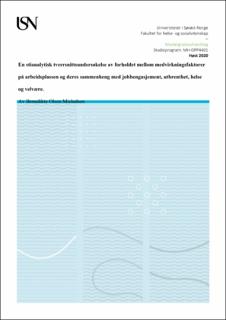| dc.contributor.advisor | Øvergård, Kjell Ivar | |
| dc.contributor.author | Michalsen, Benedikte Olsen | |
| dc.date.accessioned | 2021-11-26T09:52:50Z | |
| dc.date.available | 2021-11-26T09:52:50Z | |
| dc.date.issued | 2020 | |
| dc.identifier | no.usn:wiseflow:2195791:35290501 | |
| dc.identifier.uri | https://hdl.handle.net/11250/2831621 | |
| dc.description.abstract | Mål: Målet med undersøkelsen var å se på sammenhenger mellom medvirkningsfaktorer på arbeidsplassen og jobbengasjement, utbrenthet, helse og velvære. Undersøkelsen kan bidra til å belyse sammenhenger som har betydning for arbeidernes helse og velvære, og hvordan fremme helse i en arbeidssetting.
Metode: Jobbressurser og -krav, positive og negative subjektive utfall og positive utfall ble studert gjennom en spørreundersøkelse tilsendt elektronisk (Nettskjema), til et bekvemmelighetsutvalg på 630 ansatte i en norsk kommune. Undersøkelsen ble gjennomført fra 15. september til 6. oktober 2019. 125 svarte på undersøkelsen (19,8 % svarrate). Data ble analysert i IBM SPSS 25 med test av Cronbach’s alpha og faktoranalyse. Deretter ble det gjennomført en stianalyse i IBM SPSS AMOS.
Resultater: Cronbach`s alpha av skalaene i undersøkelse var mellom .794 - .929 og faktoranalysen viste god differensiering mellom indikatorer på de forskjellige faktorene i spørreundersøkelsen. Data viste videre at modell 2, uten ikke signifikante koblinger, hadde best model-fit og lavest AIC-verdi (83,799). Stimodellen med best tilpasning viste at involvering hadde en indirekte signifikant stikoeffisient mot helse og velvære gjennom overbelastning, og til velvære gjennom kynisme, men ikke gjennom positive tilstander som jobbengasjement. Autonomi og utvikling hadde en indirekte signifikant stikoeffisient mot helse og velvære gjennom engasjement, og til velvære gjennom kynisme.
Konklusjon: Data fra undersøkelsen bekrefter JD-R modellens motivasjons- og utmattelsesprosess. Funn i dette utvalget viser at medvirkningskomponenten involvering ikke bidrar til å øke engasjement, men heller å redusere effektene av utbrenthet (kynisme og overbelastning), og dermed positivt på helse og velvære. Autonomi og utvikling kan bidra til økt engasjement og bedre helse og velvære, samt reduserer kynisme. Disse funnene kan ha betydning for helsefremmende arbeid og viser nødvendigheten av å se på både positive og negative utfall av arbeidsmiljøfaktorer. Gjennom dette kan man få et helhetsbilde av arbeidsmiljø og hvordan fremme helse. | |
| dc.description.abstract | Aim: The aim of this study was to examine possible connections between components of participation in the workplace and job-engagement, burnout, health and well-being. The study may shed light on contexts that are important for empolyee`s health and well-being, and how to promote health in a workplacesetting.
Method: Through a electronically questionaire (Nettskjema), both jobresources and jobdemands, as well as positive and negative outcomes was studied. The questionaire was sent to a convinience selection of 630 empoyees in a Norwegian municipality. The study was conducted between 15. September and 6. October. A total of 125 responded to the questionaire (19,8 respond rate). Data were analyzed using IBM SPSS 25 with Cronbach`s alpha test and factor analysis. A path-analysis was completed using IBM SPSS AMOS.
Results: Results from Cronbach`s alpha test of the scales were between .794 - .929 and the factor analysis showed good differentiation between the indicators on the scales. Data showed that Model 2, without non-significant links, had the best model-fit of and the lowest AIC-score (83,799). The path-model with the best model-fit showed an significant indirect correlation between involvement and health and well-being through exhaustion, and through cynism on well-being, but not through positive states such as jobengagement. Autonomy og developement had an significant indirect correlation to health and well-being through jobengagement, and through cynism on well-being.
Conclusion: The data collected confirms the motivational- and the health impairment process of the JD-R model. Findings from this selection shows that involvement doesn`t seem to increase jobengagement, but rather to reduce the effects of brunout (cynism and exhaustion), and thereby positively affect health and well-being. Autonomy and development may increase job-engagement, health and well-being, and also reduce cynism. These findings may have an impact on work health promotion and indicates the necessity of including both positive and negative outcomes of work environment factors. It may give an overall picture of the workplace environment and how to promote health. | |
| dc.language | nob | |
| dc.publisher | University of South-Eastern Norway | |
| dc.title | En stianalytisk tverrsnittsundersøkelse av forholdet mellom medvirkningsfaktorer på arbeidsplassen og deres sammenheng med jobbengasjement, utbrenthet, helse og velvære. | |
| dc.type | Master thesis | |
